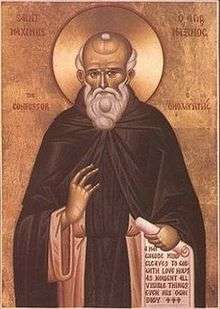February 16 (Eastern Orthodox liturgics)
February 15 - Eastern Orthodox liturgical calendar - February 17
·
All fixed commemorations below are observed on March 1 (February 29 on leap years) by Eastern Orthodox Churches on the Old Calendar.[note 1]
For February 16th, Orthodox Churches on the Old Calendar commemorate the Saints listed on February 3.
Saints
- Hieromartyrs Pamphilus of Caesarea, Priest, and 11 companions, at Caesarea in Palaestina (c. 307-309):[1][2][3][4][5][note 2]
- Valens, Deacon, and Martyrs Paul, Seleucus, Porphyrius, Julian, Theodulus, Elias, Jeremiah, Isaiah, Samuel, and Daniel.
- Saint Maruthas of Martyropolis, Bishop of Sophene and Martyropolis (422), and the Martyrs of Persia (4th century), whose relics rest in Martyropolis.[1][3][7][8]
- Saint Flavian of Antioch, Archbishop of Antioch (404)[9][10]
- Saint Flavian the Confessor, Archbishop of Constantinople (449)[1][3][11]
- Venerable Flavian the Hermit, monastic and Wonderworker.[3][12][note 3]
- Saint Mary the New, of Byzia in Thrace (9th century)[1][10]
Pre-Schism Western saints
- Saint Onesimus, of the Seventy Apostles (c. 68)[13][14][note 4][note 5] (see also: February 15)
- Saint Honestus (Honestus of Nîmes), a disciple of Saturninus of Toulouse, who preached the Gospel in Spain (270)[13][15]
- Saint Faustinus of Brescia, Bishop of Brescia and Confessor (381)[6][13][note 6]
- Hieromartyr Tanco of Verden, Bishop of Verden (815)[16][17][18][19]
Post-Schism Orthodox saints
- New Monk-martyr Romanus of Karpenision and Kapsokalyvia, Mount Athos, at Constantinople (1694)[1][10][20] (see also January 5)
- Saint Basil Gryaznov of Pavlovo-Posadsky (1869)[1][10]
- Saint Macarius (Nevsky), Metropolitan of Moscow, Apostle to the Altai (1926)[1][10]
- Saint Nicholas of Japan, Archbishop and Equal-to-the-Apostles (1912)[21] (see also: February 3)
Other commemorations
- Translation of the relics of Virgin-martyr Juliana of Nicomedia (304)[note 7] (see also December 21)
- Synaxis of the 'Cypriot' Icon of the Theotokos.[23][24]
Icon gallery
.jpeg) St. Maruthas of Martyropolis, Bp. of Sophene and Martyropolis
St. Maruthas of Martyropolis, Bp. of Sophene and Martyropolis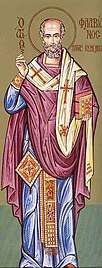 St. Flavian the Confessor, Abp. of Constantinople.
St. Flavian the Confessor, Abp. of Constantinople..jpg) Martyrdom of St. Onesimus.
Martyrdom of St. Onesimus.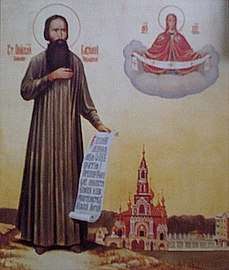
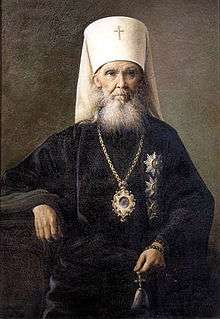
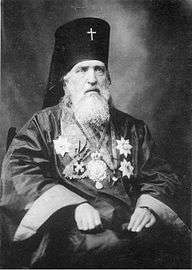 St. Nicholas of Japan.
St. Nicholas of Japan.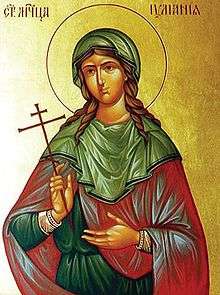 Virgin-martyr Juliana of Nicomedia.
Virgin-martyr Juliana of Nicomedia.
Notes
- The notation Old Style or (OS) is sometimes used to indicate a date in the Julian Calendar (which is used by churches on the "Old Calendar").
The notation New Style or (NS), indicates a date in the Revised Julian calendar (which is used by churches on the "New Calendar"). - "At Caesarea, in Palestine, the holy martyrs Elias, Jeremias, Isaias, Samuel, and Daniel, Egyptians, who of their own accord served the confessors of Christ condemned to labor in the mines of Cilicia, but were arrested on their return, and after being cruelly tortured by the governor Firmilian, under the emperor Galerius Maximian, were put to the sword. After them, St. Porphyry, servant of the martyr Pamphilus, and St. Seleucus, a Cappadocian, who had been victorious in several combats, being again exposed to torments, won the crown of martyrdom, the one by fire, the other by the sword."[6]
- Venerable Flavian followed the monastic state and that of asceticism from a young age. It is said that he went to the top of a mountain and spent sixty and some odd years there in fasting and prayer. God blessed him as a Wonderworker and he reposed in peace.
- The slave who ran away from his master Philemon, was converted by St Paul in Rome and was the occasion of the Apostle's letter to Philemon.
- "THE birthday of blessed Onesimus, concerning whom the apostle St. Paul wrote to Philemon. He made him bishop of Ephesus after St. Timothy, and committed to him the office of preaching. Being led a prisoner to Kome, and stoned to death for the faith of Christ, he was buried in that city; but his body was afterwards carried to the place where he had been bishop."[6]
- The successor of St. Ursicinus about the year 360, as Bishop of Brescia in Italy. He was a descendant of Sts. Faustinus and Jovita and compiled their Acts.
- "At Cumae, in Campania, the Translation of St. Juliana, virgin and martyr. Under the emperor Maximian, she was first severely scourged by her own father, Africanus, then made to suffer many torments by the prefect, Evilasius, whom she had refused to marry. Later being thrown into prison, she encountered the evil spirit in a visible manner. Finally, as a fiery furnace and a caldron of boiling oil could do her no injury, she terminated her martyrdom by decapitation."[6]
gollark: It'll vary as it grows older. I integrated that EATW formula thing so that if an egg gets 1.5x the optimal view/uv/click score it'll be removed.
gollark: Which is good, because I don't think I have the network bandwidth for that many.
gollark: You need 400UV or so to hatch things (maybe less). Guess what YAH doesn't have? 400 active users.
gollark: It won't work too well.
gollark: A melismor... ***OF DOOM***.
References
- February 16 / March 1. Orthodox Calendar (Pravoslavie.ru).
- Great Synaxaristes: (in Greek) Οἱ Ἅγιοι Πάμφιλος, Δανιήλ, Ἠλίας, Ἡσαΐας, Θεόδουλος, Ἱερεμίας, Ἰουλιανός, Οὐάλης, Παῦλος, Πορφύριος, Σαμουὴλ καὶ Σέλευκος οἱ Μάρτυρες. 16 Φεβρουαρίου. Μεγασ Συναξαριστησ.
- (in Greek) Συναξαριστής. 16 Φεβρουαρίου. Ecclesia.gr. (H Εκκλησια Τησ Ελλαδοσ).
- Martyr Pamphilius the Presbyter at Caesarea, in Palestine. OCA - Lives of the Saints.
- Rev. Sabine Baring-Gould (M.A.). "SS. Elias, Jeremias, Isaias, and Comp., MM. (A.D. 309.)." In: The Lives of the Saints. Volume the Second: February. London: John C. Nimmo, 1897. pp. 314-316.
- The Roman Martyrology. Transl. by the Archbishop of Baltimore. Last Edition, According to the Copy Printed at Rome in 1914. Revised Edition, with the Imprimatur of His Eminence Cardinal Gibbons. Baltimore: John Murphy Company, 1916. pp. 49-50.
- Great Synaxaristes: (in Greek) Ὁ Ὅσιος Μαρουθᾶς ὁ Ἐπίσκοπος καὶ οἱ Ἅγιοι Μάρτυρες ἐν Περσίᾳ. 16 Φεβρουαρίου. Μεγασ Συναξαριστησ.
- St Maruthas the Bishop of Martyropolis in Mesopotamia. OCA - Lives of the Saints.
- St Flavian, Archbishop of Antioch. OCA - Lives of the Saints.
- March 1 / February 16. Holy Trinity Russian Orthodox Church (A parish of the Patriarchate of Moscow).
- Great Synaxaristes: (in Greek) Ὁ Ἅγιος Φλαβιανὸς Πατριάρχης Κωνσταντινουπόλεως. 16 Φεβρουαρίου. Μεγασ Συναξαριστησ.
- Great Synaxaristes: (in Greek) Ὁ Ὅσιος Φλαβιανός. 16 Φεβρουαρίου. Μεγασ Συναξαριστησ.
- February 16. Latin Saints of the Orthodox Patriarchate of Rome.
- Rev. Sabine Baring-Gould (M.A.). "S. Onesimus. (A.D. 95.)." In: The Lives of the Saints. Volume the Second: February. London: John C. Nimmo, 1897. pp. 312-313.
- Rev. Sabine Baring-Gould (M.A.). "S. Honestus, P. M. (About A.D. 270.)." In: The Lives of the Saints. Volume the Second: February. London: John C. Nimmo, 1897. p. 313.
- Great Synaxaristes: (in Greek) Ὁ Ἅγιος Τάνκο Ἐπίσκοπος Βέρντεν. 16 Φεβρουαρίου. Μεγασ Συναξαριστησ.
- Rev. Alban Butler (1711–73). St. Tanco, or Tatta, Bishop and Martyr, Native of Scotland. The Lives of the Saints, Volume II: February. 1866. (Bartleby.com).
- Very Rev. John O'Hanlon. "Article I. — St. Tanchon, or Tanco, Martyr and Third Bishop of Verden, in Saxony. [Eighth and Ninth centuries.]." In: Lives of the Irish Saints: With Special Festivals, and the Commemorations of Holy Persons. Vol. II. Dublin, 1875. pp. 567-569.
- Rev. Sabine Baring-Gould (M.A.). "S. Tanco, B. of Verden. (About A.D. 800.)." In: The Lives of the Saints. Volume the Second: February. London: John C. Nimmo, 1897. p. 317.
- Great Synaxaristes: (in Greek) Ὁ Ἅγιος Ρωμανὸς ὁ Ὁσιομάρτυρας. 16 Φεβρουαρίου. Μεγασ Συναξαριστησ.
- St Nicholas, Equal of the Apostles and Archbishop of Japan. OCA - Lives of the Saints.
- Great Synaxaristes: (in Greek) Ὁ Ἅγιος Ἠλίας ὁ Ἱερομάρτυρας. 16 Φεβρουαρίου. Μεγασ Συναξαριστησ.
- Great Synaxaristes: (in Greek) Σύναξις Ὑπεραγίας Θεοτόκου ἐν Κύπρῳ. 16 Φεβρουαρίου. Μεγασ Συναξαριστησ.
- The Autonomous Orthodox Metropolia of Western Europe and the Americas. St. Hilarion Calendar of Saints for the year of our Lord 2004. St. Hilarion Press (Austin, TX). p. 15.
Sources
- February 16 / March 1. Orthodox Calendar (Pravoslavie.ru).
- March 1 / February 16. Holy Trinity Russian Orthodox Church (A parish of the Patriarchate of Moscow).
- February 16. OCA - The Lives of the Saints.
- The Autonomous Orthodox Metropolia of Western Europe and the Americas. St. Hilarion Calendar of Saints for the year of our Lord 2004. St. Hilarion Press (Austin, TX). p. 15.
- The Sixteenth Day Day of the Month of February. Orthodoxy in China.
- February 16. Latin Saints of the Orthodox Patriarchate of Rome.
- The Roman Martyrology. Transl. by the Archbishop of Baltimore. Last Edition, According to the Copy Printed at Rome in 1914. Revised Edition, with the Imprimatur of His Eminence Cardinal Gibbons. Baltimore: John Murphy Company, 1916. pp. 49-50.
- Rev. Richard Stanton. A Menology of England and Wales, or, Brief Memorials of the Ancient British and English Saints Arranged According to the Calendar, Together with the Martyrs of the 16th and 17th Centuries. London: Burns & Oates, 1892. p. 72.
Greek Sources
- Great Synaxaristes: (in Greek) 16 Φεβρουαρίου. Μεγασ Συναξαριστησ.
- (in Greek) Συναξαριστής. 16 Φεβρουαρίου. Ecclesia.gr. (H Εκκλησια Τησ Ελλαδοσ).
Russian Sources
- (in Russian) 1 марта (16 февраля). Православная Энциклопедия под редакцией Патриарха Московского и всея Руси Кирилла (электронная версия). (Orthodox Encyclopedia - Pravenc.ru).
This article is issued from Wikipedia. The text is licensed under Creative Commons - Attribution - Sharealike. Additional terms may apply for the media files.

